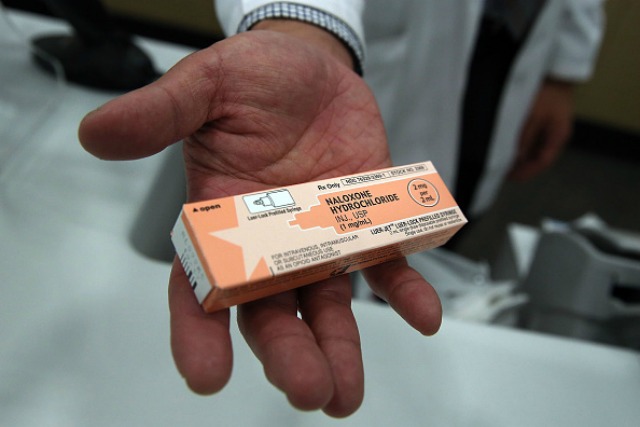Hundreds Of Overdose-Reversing Drugs Issued To Ex-Inmates Leaving Cook County Jail
By Stephen Gossett in News on Jul 31, 2017 4:59PM

A pharmacist at a Walgreens store holds a box of the overdose antidote Naloxone Hydrochloride in New York City / Getty Images / Photo: Spencer Platt
The opioid crisis has surged across the nation—and in the state of Illinois—over the last several years. The nationwide rate of drug overdoses spiked by 137 percent between 2000 and 2014, according to the Centers for Disease Control and Prevention. And in Illinois, more people died from opioid drug overdoses than all gun-related causes combined in 2014, according to the Illinois Department of Public Health.
In efforts to help stem the crisis in Chicago, the Cook County Health & Hospitals System is giving out naloxone—the nasal-spray drug used to reverse overdoses by blocking opioid effects—to certain at-risk inmates as they leave Cook County Jail. Some 400 former prisoners were given naloxone (known as Narcan under its brand name) upon leaving jail since last summer, according to the Associated Press.
Departing addicts are most likely to fatally overdose within two weeks of leaving jail, hence the timing of the intervention outreach, Sheriff Tom Dart said. "We've got to keep them alive (and) if we can get them through that two-week window, they might get treatment, get off drugs," Dart told the AP.
Some 900 prisoners have also been trained on how to use the spray since the summer of 2016, the AP reports.
Ease of Narcan access has caused some hostility in communities most beset by the opioid epidemic. (See the New Yorker's must-read "The Addicts Next Door" from last month.) But as Dart said, countering would-be criticism, "We can't get them into treatment if they're dead." As the AP notes, the World Health Organization has recommend expanded naloxone access in confronting the opioid crisis.
The move is one prong in an attempt to improve transition of the former incarcerated as they move from the prison system to the public. A recent partnership between the Sheriff's office and the University of Chicago Health Lab launched a new Supportive Release Center to give former inmates, including those with substance-abuse issues, a healthier release.
“The big, big problem we face, though was, we did all this work inside the jail, and then scrambled like there’s no tomorrow to try to triage something on the way out the door, but we didn’t have the partners... This is revolutionary, what we’re talking about here,” Dart told WTTW about the facility.
Note: this post has been corrected to reflect Cook County Health & Hospitals System's role in the program.